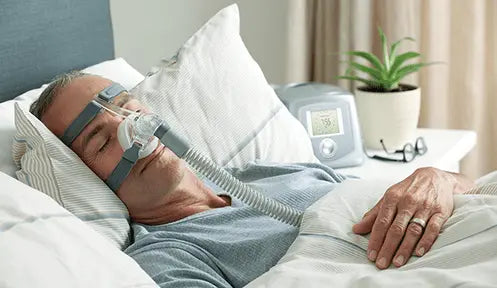
Sleep apnea: what is it?
Sleep apnea: what is it?
Do you tend to snore or feel tired in the morning? Be careful, you may be suffering from sleep apnea! Understand everything about this syndrome which affects 4% of the population in France, its causes, its consequences and its treatments.

Why is your sleep disturbed?
There are various reasons that can affect sleep.
This can be cmedical conditions such as chronic pain that makes sleep uncomfortable or taking medication that affects the sleep cycle and can lead to insomnia. psychological state or your habits, such as stress or anxiety; irregular sleep patterns that disrupt the natural circadian rhythm; or the use of stimulants such as caffeine, nicotine, or alcohol.
It can also be sleep disorders which represent a very broad category of problems that affect sleep for various reasons such as insomnia, restless legs syndrome, narcolepsy, and parasomnias (such as sleepwalking) are often symptoms of sleep apnea.
In particular, we will deal more specifically with one type of sleep disorder: Lsleep apnea, centered on respiratory interruptions.
Whatever your problem, it is essential to talk to your doctor and get follow-up!
So what is sleep apnea?
L'sleep apnea is a disorder seriousness characterized by intermittent stops of breathing during sleep. These pauses can last from a few seconds to several minutes and occur frequently every hour. This leads to a reduction in oxygen in the blood and causes frequent awakenings, often unconscious. Sleep apnea untreated may have significant repercussions, such as daytime sleepiness, difficulty concentrating, high blood pressure, and an increased risk of cardiovascular problems. It can significantly impair quality of life and general health.
What signs may indicate sleep apnea?
Symptoms
During sleep
Loud and frequent snoring: Not all snoring necessarily means apnea.
Breathing pauses: Stops in breathing followed by noisy resumptions or gasps.
Frequent awakenings: Often unconscious, caused by breathing difficulties.
Restless sleep: Move often, turn around and change positions to try to find more fluid breathing.
During the day
Excessive fatigue: Feeling like you're never well rested
Daytime sleepiness: Strong desire to sleep during the day.
Difficulty concentrating and memory disorders.
Irritability and mood swings.
Morning headaches : Often due to lack of oxygen during the night.
Dry mouth or sore throat upon waking, caused by mouth breathing during sleep.
What are the different types of sleep apnea?
There are three main types:
- Obstructive sleep apnea (OSA) : The most common form, caused by blockage of the upper airway due to excessive relaxation of soft tissues.
- Central sleep apnea : More rarely, it occurs when the brain does not communicate correctly with the muscles responsible for breathing.
- Complex apnea : A combination of the two previous forms.
The causes of sleep apnea vary depending on the type of apnea.
What could be the causes?
For theObstructive sleep apnea (OSA), it could be several factors as :
- Overweight and Obesity : Excess fatty tissue around the neck and throat can compress the airways.
- A Morphology of the Respiratory Tracts : A wide tongue, large tonsils, a narrow jaw, or an elongated uvula can restrict airflow.
- The Age : With age, the muscles of the respiratory tract lose their tone, making it easier for them to relax during sleep.
- Genetic factors : The shape and structure of the airways can be inherited.
- Consumption of alcohol and sedatives : These substances relax the muscles of the airways, increasing the risk of obstruction.
For Central Sleep Apnea (CSA) it could be:
- Neurological conditions : Diseases that affect the brain, such as strokes or certain head injuries.
- Heart failure : Can disrupt breathing through changes in nerve signals.
- Use of certain medications : Some opioid pain relievers can reduce the brain's ability to regulate breathing.
Mixed Apnea is a combination of both forms, with both obstructive and central causes.
These causes may contribute to the onset of sleep apnea, and understanding these origins can guide appropriate treatment.
What happens if sleep apnea is left untreated?
Failure to treat sleep apnea can lead to serious consequences for health and quality of life. First, chronic fatigue and the daytime sleepiness result from interruptions in deep sleep, increasing the risk of accidents. The effects on cardiovascular health are significant, with an increased risk ofhypertension, of heart disease and ofstroke, due to repeated interruptions in breathing.
On a mental level, lack of restorative sleep leads to cognitive disorders such as memory and concentration problems, as well as irritability increased and a risk of depressionThe immune system is also weakened, making the body more vulnerable to infections, and hormonal disruptions can increase risks of type 2 diabetes and promote the weight gain, thus aggravating the apnea.
Finally, the disturbed sleep and the loud snoring often affect the life of a couple, leading to relational tensions. treatment of apnea is essential to avoid these complications and sustainably improve health and well-being.
What are the treatments for sleep apnea?
Treatments for sleep apnea vary depending on the type (obstructive, central, or mixed) and severity.
For theobstructive sleep apnea, options include lifestyle changes (weight loss, change in sleeping position), oral appliances for mild to moderate cases, and the PPC (continuous positive airway pressure) for more severe cases, which is very effective but sometimes uncomfortable. For some patients, the surgery or the respiratory tract stimulation can be considered.
L'central apnea is often treated with specialized respiratory therapies such as BiPAP, which adjusts breathing pressure. In some cases, treating underlying causes, such as heart or neurological problems, can help.
L'mixed apnea often requires a combination of PPC and of specialized respiratory therapies to manage obstructive and central aspects.
Each treatment has its pros and cons, ranging from non-invasive solutions for mild cases to more complex devices or interventions for severe cases. A proper diagnosis is essential to choose the best option.
A simple and effective solution!
Do you know about Air Vital nasal patches?
Fight Apnea with Air Vital!
THE nasal patch is a simplest solution for the forms ofmild and moderate apnea since it does not require no prescription !
Just place magnetic nasal strip on the nose before going to bed, this dilates the nasal passages, facilitating so the breathing during sleep.
They are : NO SIDE EFFECTS - NOISELESS - WITHOUT PRESCRIPTION
Get restful sleep and better breathing. No more snoring!
The Air Vital solution
At the house of Vital Air, we offer an innovative approach to help reduce nighttime breathing problems. Our solutions are designed to promote better airflow and minimize breathing interruptions.
Why Choose Air Vital?
- Improved Breathing : Our products help keep the airways open, thus reducing apnea episodes and optimizing sleep quality.
- Maximized Comfort : Designed to be discreet and comfortable to wear, our products do not disturb your sleep and adapt easily.
- Advanced Technology : The solutions Vital Air are backed by extensive research to provide proven effectiveness against respiratory disorders.
Discover now the Air Vital magnetic nasal strips !
Reviews from our users
"Since I have been using the products Vital Air, my apnea problems have diminished and I wake up rested every morning." - Julien M.
"The solutions Vital Air have really changed my quality of sleep. I no longer wake up constantly during the night and I feel revitalized." - Sarah L.
Improve your sleep today with Vital Air.



